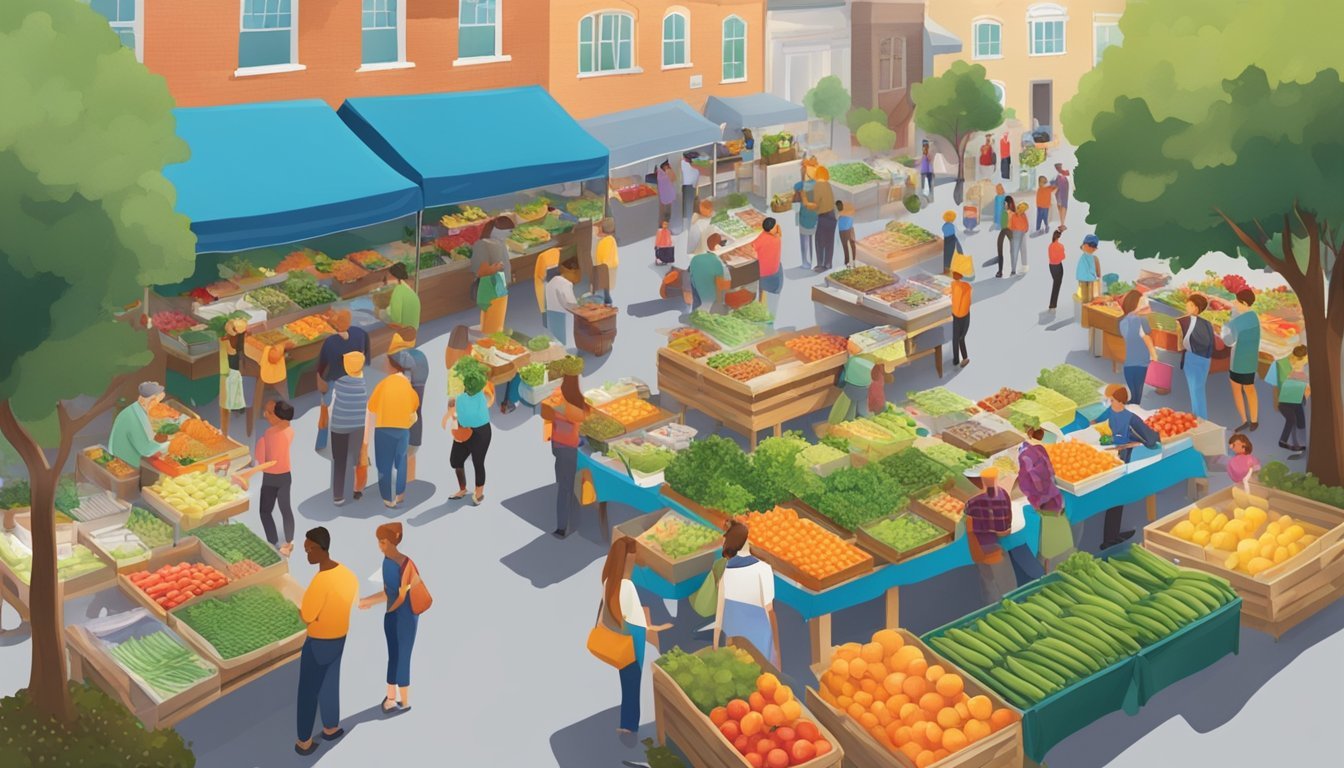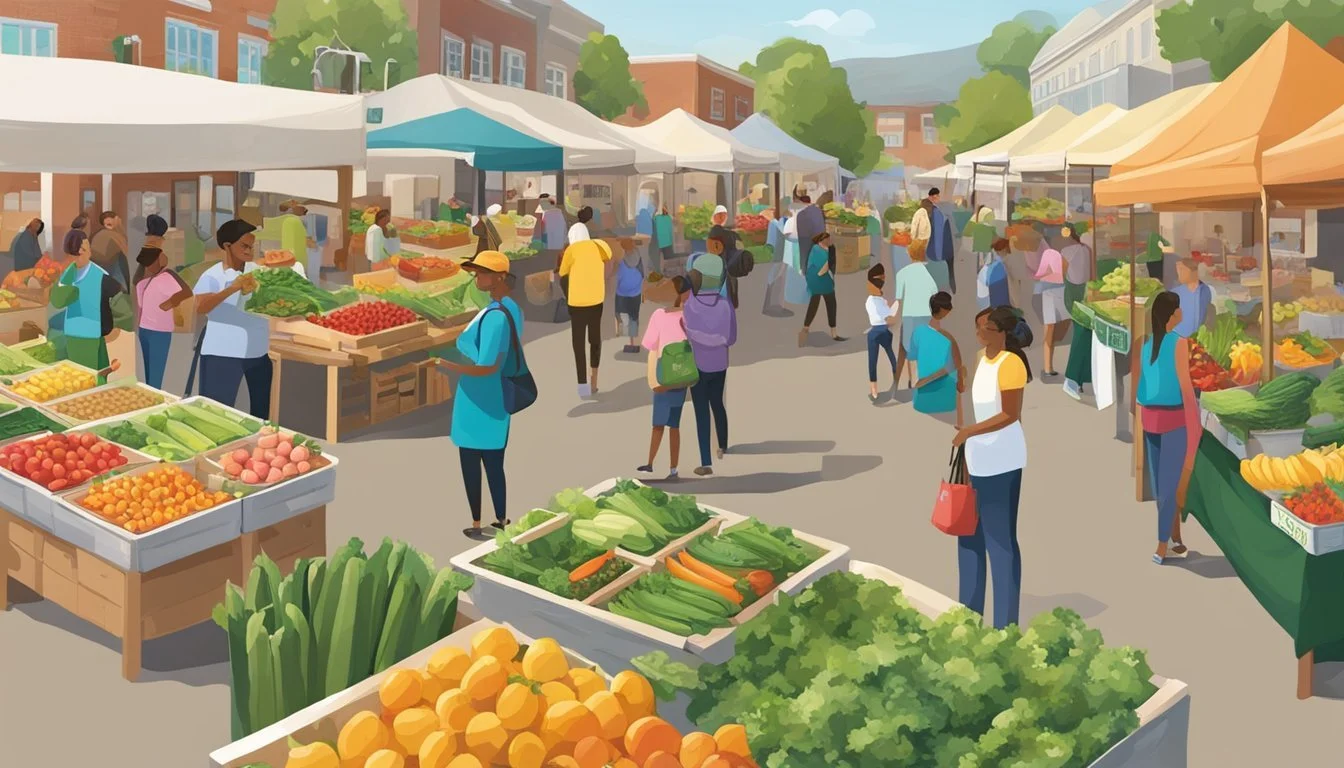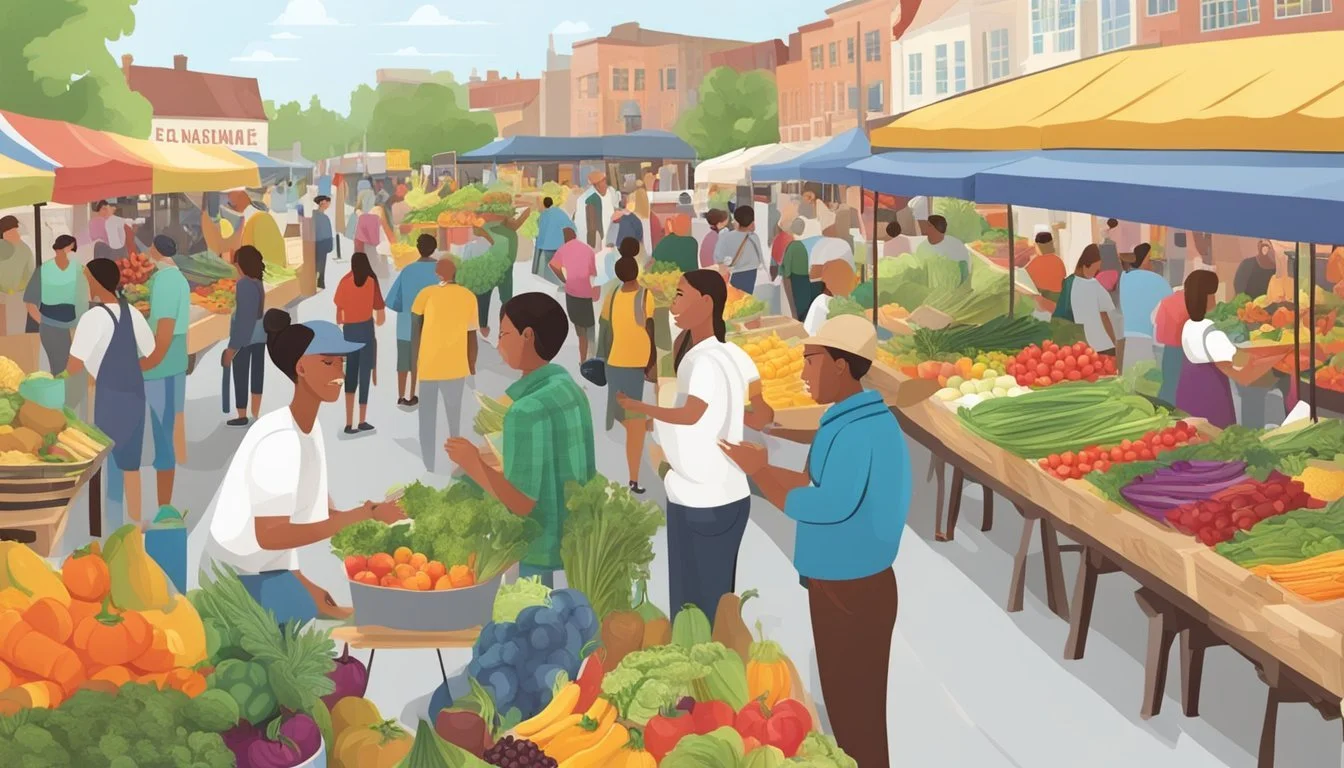The Connection Between Farmers' Markets and Food Education
Cultivating Awareness
Farmers' markets serve as critical hubs for nutrition education and the promotion of healthy food choices. These markets provide a unique venue where consumers can directly engage with those who grow their food. This interaction not only supports local agriculture but also fosters an environment where food education can thrive. By offering a selection of fresh produce and homemade goods, farmers' markets encourage consumers to learn about the nutritional benefits of incorporating fresh fruits and vegetables into their diets.
Integral to the mission of many farmers' markets is the advancement of nutrition education. As consumers browse through stalls of colorful produce and artisanal products, they often encounter opportunities for learning. Whether through cooking demonstrations, tasting sessions, or informational brochures, the education imparted at these markets emphasizes the importance of healthy eating practices. Farmers and vendors play a crucial role as educators, sharing knowledge on how to prepare the fresh produce they sell, thus making nutrition education accessible and practical.
These community gatherings not only offer access to nutritious food but also serve as platforms for imparting knowledge about sustainable food systems and the benefits of eating seasonally. Embracing the educational offerings at farmers' markets can equip individuals with the knowledge to make healthier dietary choices, impacting both their personal well-being and the health of their communities. As an intersection of commerce, culture, and education, farmers' markets are poised to be cornerstones in the movement towards a more informed and health-conscious society.
Importance of Farmers' Markets
Farmers' markets play a pivotal role in connecting consumers with locally sourced, high-quality produce, bolstering local economies, and promoting sustainable agriculture.
Boosting Local Economies
Farmers' markets provide local farmers with a direct sales avenue, often resulting in better financial returns compared to traditional retail. These markets act as small business incubators, effectively stimulating local economies. According to the Farmers' Market Coalition, these markets foster close relationships among local producers and customers, which helps in retaining economic capital within the community.
Promoting Fresh, Local Food
These markets stand out for offering fresh produce to consumers directly from local farmers. The reduced transportation for produce not only retains the nutritional value but also supports the consumption of seasonal fruits and vegetables. Moreover, they often serve as access points to nutritious food in areas that supermarkets may overlook.
Sustainable Agricultural Practices
Farmers’ markets encourage sustainability in agricultural practices by favoring short supply chains and minimal packaging, reducing the environmental footprint. As promoters of local foods, they help in preserving diverse local plant varieties and breeds, which is crucial for the conservation of genetic resources and biodiversity.
Food Education at Farmers' Markets
Farmers' markets serve as important venues for food education, often focusing on the nutritional and health benefits of fresh produce, providing cooking demonstrations and workshops, and having a notable impact on children's food choices.
Nutrition and Health Benefits
Farmers' markets play a critical role in nutrition education by providing access to a variety of fresh fruits and vegetables, which are essential for a healthy diet. They often feature signage or informational pamphlets highlighting the nutritional content and health advantages of their offerings. Regular consumption of market produce can contribute to a balanced diet and help prevent diet-related chronic diseases.
Cooking Demonstrations and Workshops
Many farmers' markets offer cooking demonstrations and workshops to educate consumers on preparing fresh produce. These events are opportunities to learn about integrating nutrient-dense foods into everyday meals, which promotes healthy eating habits. Attendees can directly interact with knowledgeable vendors and food experts, gaining practical skills and new recipes.
Impact on Children's Food Choices
Engagement with farmers' markets has shown positive effects on children's food choices. Exposure to a wide range of fresh foods and nutrition education at markets can influence children's preferences towards healthier options. Efforts such as taste tests and interactive activities help foster an appreciation for natural flavors, steering children away from processed foods and toward more nutritious dietary habits.
Accessibility and Availability
Accessibility to healthy food options and the availability of fresh produce are critical factors in combating food insecurity. Farmers' markets play a significant role in bridging the gap between food production and consumption, particularly within food deserts where conventional grocery options are scarce.
Overcoming Distance Challenges
Access to nutritious food is hindered when there is significant distance between consumers and fresh food sources. Urban areas classify neighborhoods as food deserts if there's no supermarket within a mile, and rural areas face a similar struggle if they're situated more than ten miles from one. Farmers' markets mitigate these distance challenges by providing a nearby source of fresh produce and whole foods that may not be available in local convenience stores.
Policy Interventions for Wider Accessibility
Government policies can enhance the accessibility of healthy foods through supportive measures, such as nutrition benefit programs. By allowing farmers' markets to accept programs like the Supplemental Nutrition Assistance Program (SNAP), authorities can increase the patronage of these markets, giving low-income individuals the ability to purchase healthier food options that they might otherwise not access.
Farmers' Markets in Food Deserts
In food deserts, farmers' markets serve as a crucial community-level intervention. Their strategic placement in underserved areas addresses the issue of food accessibility and helps to ensure that these communities are not solely reliant on convenience stores that often lack fresh, nutritious food. By offering locally grown produce, farmers' markets provide an essential service in areas where grocery stores are either too few or too distant.
Economic Aspects of Farmers' Markets
Farmers' markets play a distinctive role in the local economy by directly connecting producers and consumers. They offer a unique avenue for customers to access fresh produce, while also supporting the livelihoods of local farmers and contributing to the economic vibrancy of communities.
Comparing Costs with Supermarkets
Farmers' markets often provide competitively priced products compared to supermarkets. While some markets feature premium-priced organic or specialty items, many offer affordable options for a range of budgets. Prices at farmers' markets may be higher for some items, however, the direct purchasing model also eliminates middlemen, potentially allowing customers to buy fresher produce at comparable or lower prices than in supermarkets.
Support for Low-Income Populations
Farmers' markets offer economic advantages, especially for low-income populations. Some markets accept food assistance programs like SNAP (Supplemental Nutrition Assistance Program) and WIC (Women, Infants, and Children), making healthy food more accessible to those in need. This inclusion fosters affordability and ensures a wider population can benefit from fresh local produce.
Farmers' Market Nutrition Programs (FMNP)
The FMNP serves specific sectors by providing coupons that can be used at farmers' markets. This initiative supports both farmers and consumers:
It boosts the income of local farmers by bringing additional customers.
It educates recipients about the benefits of fresh and nutritious food, promoting healthier dietary choices.
By directly benefiting participants of WIC and low-income seniors, FMNP plays a crucial role in intertwining economic and nutritional education at farmers' markets.
Community Impacts and Urban Farming
Urban farming initiatives have increasingly served as critical bridges between local food systems and urban communities. These efforts amplify community health, provide educational opportunities, and foster economic development within the green sector of the economy.
Enhancing Community Gardens
Community gardens bolster the green sector by turning underused urban spaces into productive lands. They provide a platform for hands-on food education and encourage the consumption of fresh, locally grown produce. In these spaces, residents of urban areas gain valuable insights into sustainable farming practices and the importance of food security.
Urban Areas and Local Food Systems
The infusion of urban agriculture into local food systems has transformed food distribution within urban areas. Through the establishment of farmers' markets, the community can access locally grown food, directly supporting the local economy and reducing carbon footprints associated with long-distance transportation. These local systems also play a pivotal role in fostering food education and enabling consumers to learn about the sources and production methods of their food.
Engaging Community Members
Local community members engage with urban farming initiatives as both consumers and volunteers, gaining a deeper understanding of the agricultural process. Participation in urban agriculture educates community members about:
Seasonal Growing: Recognizing seasonal patterns of local produce.
Nutrition: Learning the nutritional benefits of fresh produce.
Environmental Stewardship: Developing sustainable practices that contribute to environmental health.
By actively involving community members, urban agriculture empowers residents to contribute to the sustainability and resilience of their food systems.
Health Outcomes and Dietary Habits
Farmers' markets play a crucial role in enhancing health outcomes by influencing dietary habits. They provide access to fresh produce which can be instrumental in preventing chronic diseases and promoting overall well-being.
The Role in Preventing Obesity and Diabetes
Farmers' markets offer an abundance of whole, unprocessed foods, rich in nutrients and low in calories. Increased fruit and vegetable intake from such sources can lead to a healthier body mass index (BMI) and reduced risk of obesity. Moreover, by offering healthier alternatives to high-calorie, processed foods, they support dietary changes that are essential in both preventing and managing diabetes.
Changing Food Consumption Patterns
Patrons of farmers' markets often gain exposure to a wider variety of fruits and vegetables, which can catalyze a shift in food consumption patterns. Education at these markets often includes information on the benefits of eating seasonal, locally grown produce, leading to more informed food choices and an increase in fruit and vegetable intake.
Promoting Physical Activity
Visiting farmers' markets can contribute to an increase in physical activity, as shopping at these markets often involves walking, carrying goods, and sometimes participating in other health-oriented community events. Regular physical activity is known to improve health outcomes by aiding in weight management and enhancing metabolic function, factors critical in combating obesity and diabetes.
Consumer Education and Engagement
Farmers' markets play a crucial role in educating consumers, fostering trust, and promoting green consumption. These spaces are not just centers for transactions but also hubs for knowledge exchange and community involvement.
Building Trust with Local Consumers
Farmers' markets provide an opportunity for farmers to connect with their patrons face-to-face. Through these interactions, consumers can ask questions about farming practices and witness the transparency of food production. Transparency is key in building trust; when consumers understand where their food comes from and how it's produced, they're more likely to support local farmers.
Product Knowledge and Green Consumption
Education on green products at farmers' markets helps consumers make informed choices about sustainable consumption. Patrons learn about the environmental benefits of locally sourced goods and the importance of supporting eco-friendly products. This knowledge often translates into increased demand for green product consumption.
Local Attachment and Market Loyalty
Regular attendance at a farmers' market usually enhances a consumer's sense of local attachment. As they become frequent buyers, they develop a connection with food producers, which contributes to a stronger market loyalty. This bond is beneficial for the sustainability of the farmers' markets and the viability of local economies.
Conclusion
Farmers' markets serve as critical community-level interventions, offering opportunities for sustainable economic development and promoting equity in food access. These markets facilitate the education of consumers on the benefits and methods of preparing fresh, seasonal produce. By hosting educational events such as cooking demonstrations and food sampling, they effectively disseminate nutritional knowledge and encourage healthier dietary habits.
Sustainable Economic Development:
Farmers gain access to local markets, fostering economic growth within the community.
Equity in Food Access:
Strategically located in underserved areas, farmers' markets help bridge the gap in food deserts, making healthy options more accessible.
Educational Impact:
Nutrition education impacts consumer choices positively.
Cooking demonstrations provide practical lessons on using fresh ingredients.
Interaction with farmers offers insights into food sourcing and production.
Healthcare Implications:
Increased fruit and vegetable intake contributes to community health, potentially reducing healthcare costs associated with chronic diseases.
Recommendations:
Expand farmers' markets in diverse communities.
Continue and increase funding for assistance programs intersecting with farmers' markets.
Encourage partnerships between healthcare providers and farmers' markets to underline the importance of diet on health.
In conclusion, farmers' markets are more than just food retail spaces—they are hubs for community engagement, education, and a stepping stone toward a healthier society.







